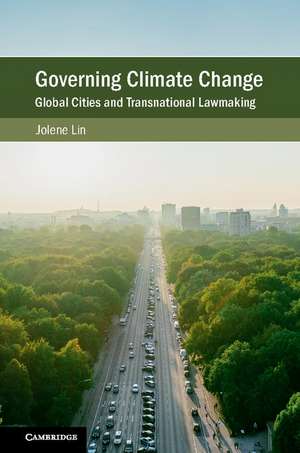Governing Climate Change: Global Cities and Transnational Lawmaking: Cambridge Studies on Environment, Energy and Natural Resources Governance
Autor Jolene Linen Limba Engleză Paperback – 20 iun 2018
| Toate formatele și edițiile | Preț | Express |
|---|---|---|
| Paperback (1) | 245.67 lei 38-44 zile | |
| Cambridge University Press – 20 iun 2018 | 245.67 lei 38-44 zile | |
| Hardback (1) | 694.48 lei 43-57 zile | |
| Cambridge University Press – 20 iun 2018 | 694.48 lei 43-57 zile |
Preț: 245.67 lei
Preț vechi: 279.16 lei
-12% Nou
47.01€ • 49.21$ • 39.13£
Carte tipărită la comandă
Livrare economică 26 martie-01 aprilie
Specificații
ISBN-10: 1108440983
Pagini: 222
Dimensiuni: 152 x 228 x 12 mm
Greutate: 0.32 kg
Editura: Cambridge University Press
Colecția Cambridge University Press
Seria Cambridge Studies on Environment, Energy and Natural Resources Governance
Locul publicării:New York, United States
Cuprins
1. Global cities, climate change and transnational lawmaking; 2. Theoretical framework; 3. The rise of the city in international affairs; 4. City action on climate change; 5. Transnational urban climate governance via networks – the case of C40; 6. Cities as transnational lawmakers; 7. A normative assessment of urban climate law; 8. Conclusion.
Recenzii
'A vivid and timely account of the important and complex role that cities play in transnational climate change governance.' Liz Fisher, Corpus Christi College, University of Oxford
Descriere
Cities are no longer just places to live in. They are significant actors on the global stage, and nowhere is this trend more prominent than in the world of transnational climate change governance (TCCG). Through transnational networks that form links between cities, states, international organizations, corporations, and civil society, cities are developing and implementing norms, practices, and voluntary standards across national boundaries. In introducing cities as transnational lawmakers, Jolene Lin provides an exciting new perspective on climate change law and policy, offering novel insights about the reconfiguration of the state and the nature of international lawmaking as the involvement of cities in TCCG blurs the public/private divide and the traditional strictures of 'domestic' versus 'international'. This illuminating book should be read by anyone interested in understanding how cities - in many cases, more than the countries in which they're located - are addressing the causes and consequences of climate change.














